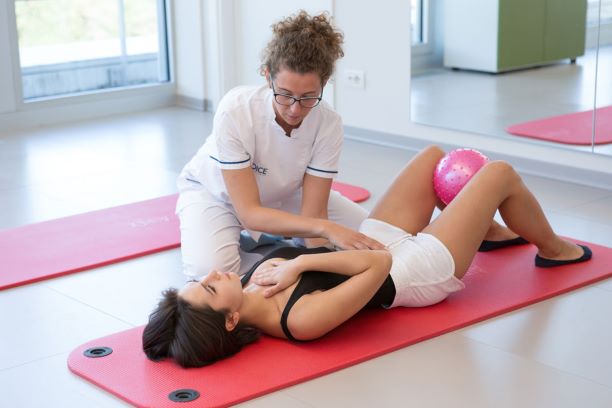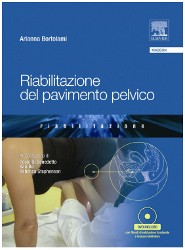The seminar is addressed exclusively to Medical Doctors and Physiotherapists,(AEI, ΤΕΙ or other equivalent degrees).
The language of the seminar will be Italian and there will be simultaneous translation into Greek.
LLLC, EPIMORFOSIS intends to organize a Pelvic Floor Rehabilitation seminar Module 1 with professor Dott.ssa Arianna Bortolami.
The seminar lasts 4 days and will be held in Athens.
The cost of the seminar is 550€.
To finalize your participation, a deposit of 200€ must be paid.
The remaining amount of 350€ must be deposited at least 2 days before the beginning of the seminar.
The seminar provides for Individual optional practice among the trainees
To complete the method, a 2nd part (4 days) is foreseen, which will be scheduled to take place on the 2nd semester of 2025.
For participants who wish to receive certification in the method, examinations are provided at the end of Part 2.
PRESENTATION OF THE 1st 2 DAYS OF THE SEMINAR
The seminar lasts 4 days.
In the first two days we will deal with Physiotherapy and Pelvic Ground Rehabilitation in urinary incontinence in women and men.
This seminar includes rehabilitation strategies for various forms of urinary incontinence, of non-neurogenic origin, for women and men. Physiotherapy and pelvic floor rehabilitation are the first treatment option for non-neurogenic urinary incontinence.
This symptom, defined as involuntary loss of urine, has a profound effect on quality of life: sufferers often report feelings of embarrassment, stress, discomfort to the environment, and people close to them.
This can lead to changes in emotional, relational and social life. In addition, incontinence can have significant financial costs.
In recent decades, the international literature has paid close attention to this problem: in this way, scientific data and experiments have shown the effectiveness of various treatment options, including physiotherapy and pelvic floor rehabilitation.
It consists of a series of techniques and equipment, which through a process of clinical reasoning and in the light of the example of evidence based practice, allow the management of the symptom associated with urinary incontinence of non-neurogenic etiology.

SPECIFIC OBJECTIVES
At the end of the 1st 2 days the participant will be able to:
• Knows what forms of incontinence can be treated with physical therapy and pelvic floor rehabilitation
• Performs functional evaluation of the patient suffering from urinary incontinence of non-neurogenic origin
• Plan the physiotherapy intervention and rehabilitation
• Knows techniques and tools regarding the definition, scientific data, how to use, indications and contraindications
• Knows the final results of the treatment that followed
PRESENTATION OF THE 2ND DAY 2 OF THE SEMINAR
In the 2nd two days we will deal with Physiotherapy and Pelvic Ground Rehabilitation for anal-rectal symptoms.
The seminar is aimed at medical and rehabilitation departments and includes rehabilitation for recto-rectal symptoms such as anal and stool incontinence, the urgent need to pass stool, constipation or anal pain that can closely affect the patient’s quality of life, often quite seriously.
Those who suffer often report feelings of shame, anxiety, discomfort to the environment and the people around them and present limitations in their social life that are often crucial to relationships.

SPECIFIC OBJECTIVES
At the end of the 2nd 2 days the participant will be able to:
• Knows what forms of constipation, stool incontinence and other anal-rectal symptoms can be treated with physical therapy and pelvic floor rehabilitation
• Performs functional evaluation of the patient suffering from constipation, fecal incontinence and other anal-rectal symptoms
• Plan the physiotherapy intervention and rehabilitation
• Knows techniques and tools regarding the definition, scientific data, how to use, indications and contraindications
• Knows the final results of the treatment that followed
 The book by Dott.ssa Arianna Bortolami
The book by Dott.ssa Arianna Bortolami
Images: 73 + 94 disegni Rehabilitation of the pelvic floor
Bookbinding: brossurato Author: Dott.ssa Arianna Bortolami
Size: 19.5cm x 26.5cm Title: Rehabilitation of the pelvic floor with DVD ROM
ISBN: 9788821430893 Published: May 2009
Pages: 304
Presentation
The book deals with the treatment of pelvic floor rehabilitation for urological, gynecological, ortho-proctological, sexual and painful symptoms, related to the dysfunctions of this area.
It is written by physiotherapists, specialists and other experts in the field, confirming the importance of an interdisciplinary approach.
The book is based on the specific process used in physiotherapy: functional evaluation, planning, intervention and evaluation of results, developed within a clinical reasoning.
The book is divided into three parts: Anatomy, Pathology, Rehabilitation.
The text refers to the scientific data and standardized terminology of world-renowned scientific societies, such as the International Society of Restraint (ICS).
The various phases of the restoration are described with the help of many illustrations, drawings and tables.
For the available treatment and rehabilitation techniques and means, the various methods of use are described, facilitating the understanding of clinical practice.
The book is accompanied by a DVD containing a series of annotated videos describing procedures related to functional evaluation, such as visual observation, manual evaluation, and rehabilitation therapy, such as therapeutic exercise, proposed in the various phases of the rehabilitation process. Biofeedback and functional electrical stimulation.
Contents
Day 1
09.00 – 10.30
Theoretical part – General data – Presentation and objectives of the seminar – Pelvic floor dysfunction: effects on the quality of life of the patient suffering from urinary incontinence – Epidemiology for urinary incontinence in men and women – Pelvic floor rehabilitation: contents, ways, objectives. Anatomy, Physiology, Pathology of the pelvic floor with special reference to the urinary system and the pelvic area.
10.30– 11.30
Practice: – Historical report – Scientific data in the literature – Principles of industrial and neurophysiology – Peculiarities of physiotherapy and pelvic floor rehabilitation with special reference to the patient with urinary incontinence
Cultural, social, religious aspects
Kinetic organization
Therapeutic planning
Professional
Multi-scientific dimension
11.30 – 13.00
– Functional evaluation of the patient with urinary incontinence
Oral interview (history)
Patient position
Visual observation
Manual assessment (muscle assessment of pelvic floor and other functionally related muscle groups, sensitivity, reflexes)
Individual practice: practical test in model in manual evaluation
13.00 – 14.00 Break
14.00 – 15.15
Practice: – Functional evaluation of the patient with urinary incontinence
Urine diary
Tests and questionnaires
Tests for urinary incontinence due to pelvic floor dysfunction
15.15 – 16.30
Group Internship: RolePlaying between Physiotherapist and Patient for Functional Assessment
16.30 – 17.30 Group internship: therapeutic exercises for the phases of pelvic floor awareness and modification of variant muscle parameters
17.30 – 19.00 Individual optional practice among the trainees:
For those who wish, at the end of the first day, practical exercises can be performed directly in the genital area between the trainees. The exercises will be related to manual evaluation and therapeutic exercises. They will be conducted in groups of two or three students in separate rooms and will be coordinated by the teacher who will be alternately between the groups. The duration of the activity will depend on the number of participants in this practical part. The cost will be € 50 plus VAT for anyone wishing to participate (registrations can be made on the same day). This time is not included in the collection of ECM points, so anyone who does not wish to participate will not lose any points.
Day 2
09.00 – 10.00
Establishment of physiotherapy and pelvic floor rehabilitation for urinary incontinence in women and men (therapeutic goals, choice of therapeutic equipment and method of use, etc.).
– Phases of rehabilitation therapy: awareness, modification of muscle parameters, automation.
10.00 – 11.00 – Techniques and equipment of rehabilitation treatment for urinary incontinence:
Therapeutic exercise
bladder training
biofeedback
functional electrical stimulation
vaginal cones
absorbent aids
11.00 – 12.00
Group internship: use of electrical and equipment
12.00 – 13.00
Therapeutic techniques and equipment for urinary incontinence:
behavioral therapy
self-medication at home
13.00 – 14:00 Break
14.00 – 14.30
– Indications and contraindications of pelvic floor rehabilitation treatment in the patient with urinary incontinence.
14.30 – 15.30
Group practice: therapeutic exercises for the automation phase
15.30 – 16.30
Group internship: interactive presentation with clinical case reports:
presentation of the incident
functional evaluation
rehearsal of the plan and rehabilitation program (therapeutic goals, use of therapeutic equipment)
development of individual sessions (objectives, contents, manner) or evaluation of results or discussion
16.30 – 17.15
Group internship: RolePlaying between Physiotherapist and Patient for Installation, Treatment, Evaluation of Results
17.15 – 17.30
Questions & discussion
Day 3
09.00 – 10-30
Theoretical part – General remarks – Presentation and objectives of the Seminar – Recto-rectal symptoms and pelvic floor dysfunction: effects on the patient’s quality of life – Pelvic floor rehabilitation: contents, ways, goals. Anatomy, Physiology, Pathology of the Pelvic Ground in relation to the anus and rectum
10.30 – 12.00
Practical part – Physiotherapy and pelvic floor rehabilitation – Scientific evidence in the literature – Functional evaluation of the patient with rectal symptoms
Oral interview
Patient position
Visual observation
manual assessment: (assessment of reflex sensitivity, muscle assessment of pelvic floor and other functionally related muscle groups).
Individual practice: practical testing on a model in manual evaluation
12.00 – 13.00
Individual internship:
Diary of recto-rectal dysfunction
Test and questionnaires
Notes and tests for rectal dysfunction from pelvic floor dysfunction
13.00 – 14.00 Break
14.00 – 15.00
Group Internship: RolePlaying between Physiotherapist and Patient for Functional Assessment
15.00 – 16.00
Practical and group exercise: therapeutic exercises for the phases of pelvic floor awareness and modification of modified muscle parameters
16.00 – 16.30
– Phases of rehabilitation therapy: awareness, modification of muscle parameters, automation.
16.30 -17.30 Planning of physiotherapy and rehabilitation of the pelvic floor for incontinence (therapeutic goals, choice of therapeutic equipment and method of use, etc.).
– Phases of rehabilitation therapy: awareness, modification of muscle parameters, automation
17.30 – 19.00
Individual optional practice among the trainees:
For those who wish, at the end of the first day, practical exercises can be performed directly in the genital area between the trainees. The exercises will be related to manual evaluation and therapeutic exercises. They will be conducted in groups of two or three students in separate rooms and will be coordinated by the teacher who will be alternately between the groups. The duration of the activity will depend on the number of participants in this practical part. The cost will be € 50 plus VAT for anyone wishing to participate (registrations can be made on the same day). This time is not included in the collection of ECM points, so anyone who does not wish to participate will not lose any points.
Day 4
09.00 – 10.30
– Physiotherapy and rehabilitation techniques and equipment for rectal dysfunctions associated with pelvic floor muscle dysfunction:
o Therapeutic exercise
biofeedback
rectal balloon
functional electrical stimulation
anal dilators
behavioral therapy
self-medication at home
absorbent aids
10.30 – 11.30
Group internship: use of electrical and equipment
11.30 – 12.30
– Indications and contraindications of pelvic floor rehabilitation treatment in the patient with incontinence.
12.30 – 13.00
Group practice: therapeutic exercises for the automation phase
13.00 – 14:00 Break
14.00 – 15.00
Group internship: interactive presentation with clinical case reporting:
presentation of the incident
functional evaluation
rehearsal of the plan and rehabilitation program (therapeutic goals, use of therapeutic equipment)
development of individual sessions (objectives, contents, manner) or evaluation of results or discussion
15.00 – 16.00
Group internship: RolePlaying between Physiotherapist and Patient for Installation, Treatment, Evaluation of Results
16.00 – 16.15
Questions & discussion
1. Credit or Deposit card payment
You can deposit the down payment or the total fee via credit or deposit card (Visa, Mastercard & American Express) from the webpage of each course, through VivaPayments.
You are solely responsible for the proper entry and the genuineness of your credit/deposit card’s details. EPIMORFOSIS bears no responsibility in case of any error.
Any payment commission is charged to EPIMORFOSIS
2. Deposit – Transfer to our bank account.
You can deposit or transfer the requested amount for your registration to the following accounts, writing your full name in the field “Reason for the Beneficiary”:
PIRAEUS BANK:
ΙΒΑΝ: GR5501722380005238070348955
SWIFT(BIC): PIRBGRAA
NATIONAL BANK of GREECE:
IBAN: GR6801102170000021744103439
SWIFT(BIC): ETHNGRAA
ALPHA BANK :
ΙΒΑΝ: GR4801407080708002002013410
SWIFT(BIC): CRBAGRAA
EUROBANK:
ΙΒΑΝ: GR4502600370000010201090153
SWIFT(BIC): ERBKGRAA
Beneficiary: EPIMORFOSIS KENTRO EPIMORFOSIS STELECHON YGEIAS OE
The bank transfer fee charged to EPIMORFOSIS
1. A certificate of attendance, a degree or a diploma will be issued.
2. Printed handouts are provided (notes or relevant book).
3. In case of cancellation of the seminar due to EPIMORFOSIS’s responsibility, deposited fees will be refunded immediately.
4. EPIMORFOSIS reserves the right to change the date or postopone seminars, informing participants by phone and / or sms & e-mail. In such a case participants are entitled to request full refund of their fees if they do not wish to attend the seminar on the new date or to use this amount for their participation in other seminars or services of the company.
5. In the event of a strike, government’s bans, heavy bad weather, and generally any event beyond the reasonable control of the organisers which impedes the execution of part or all of the seminar, the organizers reserve the right to change the date and time of the event. In this case the fees are not refundable but are valid as they are.
6. Cancellation of participation due to participant’s responsibility is possible only by email, as follows:
• up to 30 days prior to the start of the seminar, all deposits are refundable.
• up to 15 days prior to the start of the seminar, 50% is refundable.
• no refund after this deadline, exceptions could be only by decision of EPIMORFOSIS.
7. The realisation of the course will be confirmed by email or/and sms to be sent to participants, in time.
8. It is advised to not buy your flight tickets until you receive this confirmation email (or/and sms).
9. LLC-1 EPIMORFOSIS keeps the right to change course venues.
Hotel Delfini ***.
For more information contact tel .: +30 210 94 15 364 & 94 15 373
Σεμινάριο Αποκατάστασης Πυελικού Εδάφους Module 1 – ΑΘΗΝΑ 2025
€200.00 – €550.00
Training, a steady value for more than twenty years now, leads physiotherapy and keeps it at a very high level, well done to George Karambalis and his associates, we owe a lot to all of you.
EPIMORFOSIS organizes specialization seminars for rehabilitation professionals. I’ve watched a lot. I strongly recommend you trust EPIMORFOSIS for your specialization and lifelong information.
EPIMORFOSIS justifies its name by providing high quality courses. George Karampalis operates more like a constant “trainee” and less like an entrepreneur, and this is an additional positive fact in the effort that is put by the workers and teachers of EPIMORFOSIS.
I have known George Karampalis and EPIMORFOSIS for many years. I’ve had the opportunity to join several clinical courses and I can argue that, at the level of organisation and selection of trainers, they have a high level of recognised prestige.
My first steps in professional specialization started with EPIMORFOSIS and continue. It has been with us all these years, covering the need for modern and documented knowledge, in collaboration with internationally acclaimed educational institutions.
The best physiotherapists training institution. It enables the development of the necessary knowledge for clinical reasoning. High-quality training without having to travel abroad.


 Smart
Smart